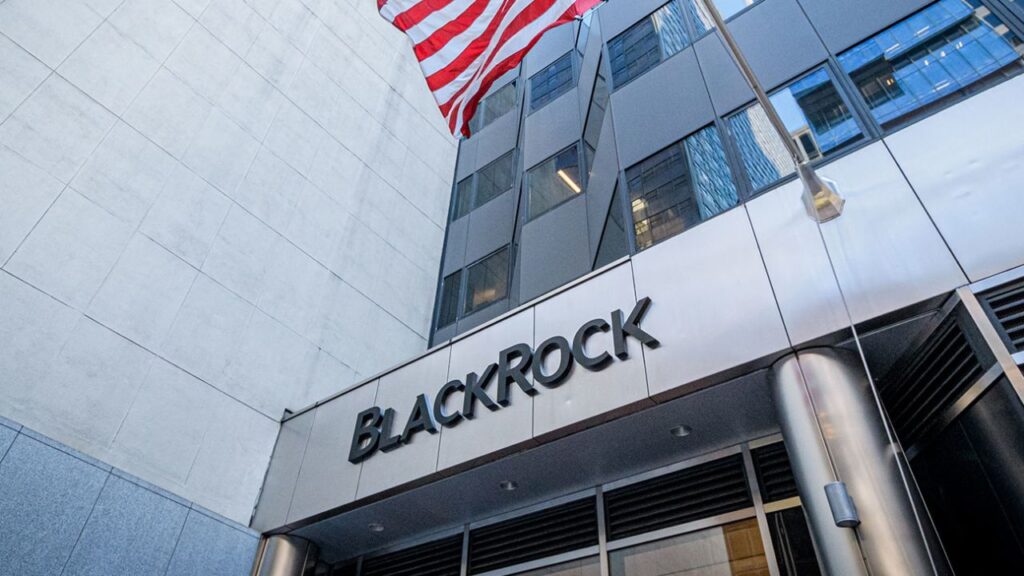Global investment firm BlackRock, known for managing $10 trillion in assets, has emphasized the significance of artificial intelligence (AI) in its mid-year outlook report.
The company sees AI as a “mega force” that could generate substantial returns for investors, particularly in today’s “unusual” market conditions.
BlackRock’s report highlights the increasing concentration of gains in the S&P 500, with only a few tech stocks driving the index.
The firm believes that investing in AI presents an opportunity to capitalize on this concentration. Despite challenging macroeconomic conditions, BlackRock’s investment team views AI as a major driver of returns.
The report identifies automation as the most apparent benefit of AI. While acknowledging the increased risk of automation for white-collar jobs, BlackRock suggests that the resulting cost savings could significantly enhance profit margins, especially for companies with high staffing costs and tasks that are easily automated.
Additionally, the firm recognizes the potential of AI-powered tools in leveraging proprietary data to create innovative models.
BlackRock also points out several key drivers of growth in the coming decade, including the global shift towards low-carbon economies, aging populations, and the rapidly evolving financial system.
The firm’s perspective on AI aligns with other voices in the investment industry. Matt Huang, CEO of Paradigm, a crypto investment firm, emphasized the compelling developments in the AI field and their significance.
However, not all commentators share the same bullish outlook on AI investments. Macro-finance commentator Financelot highlights that the recent AI boom, exemplified by the soaring shares of GPU manufacturer Nvidia, is largely driven by demand for AI-focused computing chips. He suggests that potential U.S. export restrictions on these chips could negatively impact the share prices of AI-related companies.
While BlackRock has shown enthusiasm for AI, recent developments have also seen the company turning its attention to Bitcoin.
The firm has submitted an application to the Securities and Exchange Commission for a spot Bitcoin Exchange Traded Fund (ETF), aiming to be the first to receive regulatory approval for such a product. Bloomberg analysts estimate BlackRock’s chances of approval at 50%.
In summary, BlackRock identifies AI as a powerful force that can drive significant returns for investors.
The firm sees automation, data leverage, and several macroeconomic trends as key factors contributing to AI’s growth potential.
However, there are differing opinions regarding the long-term sustainability of the AI boom, with concerns over the dependence on AI-focused computing chips.
BlackRock’s recent interest in Bitcoin further demonstrates its adaptability to emerging investment opportunities.
Other Stories:
Bitcoin (BTC) Miners Experience Record Surge in Revenue Sent to Exchanges
SYS Labs Announces Launch of Rollux EVM Layer-2 Solution
Sale of FTX’s $500 Million Stake In AI Startup Paused, Hindering Efforts To Fill $2 Billion Gap
According to Michael Shaulov, CEO and co-founder of Fireblocks, an approved BlackRock spot Bitcoin exchange-traded fund (ETF) will bring in new institutional money to Bitcoin, but it will be the retail investors who will ultimately drive significant price surges.
Shaulov made these observations during the Australian Blockchain Week, highlighting that institutional involvement in crypto may not necessarily lead to skyrocketing prices.
Shaulov pointed out that even during the mid-2020 period when there were massive inflows of institutional money, the prices didn’t see significant appreciation until retail investors fervently embraced crypto assets later in the year.
The institutions were acquiring Bitcoin slowly and utilizing algorithms that wouldn’t drive up the market.
On the other hand, retail investors, who participate in a less sophisticated manner, were responsible for dramatic price movements, with 50% increases attributed to them.
However, Shaulov acknowledged that the finite supply of Bitcoin meant that any large-scale accumulation of the cryptocurrency would ultimately impact its price.
He believed it would be easier for institutions currently not participating in the market to add Bitcoin to their allocation due to its unique properties.
Shaulov also discussed the various narratives surrounding Bitcoin among institutional investors.
He mentioned that the narrative surrounding Bitcoin is still unfolding for these institutions. Is it a hedge against inflation? Is it a public reserve currency? Is it a hedge against government financial misdealings? Shaulov personally views Bitcoin as the “ultimate insurance asset.”
He emphasized that Bitcoin possesses properties that make it valuable in times of crisis.
It is disconnected from governments, digitally native, and easily transferable.
Shaulov concluded by stating that the specific value of Bitcoin at any given point, whether it’s $15,000, $20,000, or $60,000, is not as crucial as having enough of it to survive challenging periods.
In his opinion, Bitcoin serves as a reliable asset in times of uncertainty and can provide a safeguard against adverse economic conditions.
Other Stories:
Bspin Review – Here’s Why You Shouldn’t Gamble With This Bitcoin Casino
HSBC Launches Cryptocurrency Services, Offering Bitcoin ETFs to Customers
Japan Grants Tax Exemption on Unrealized Crypto Gains for Token Issuers
The Swiss National Bank (SNB) has revealed its plans to launch a pilot project for a wholesale central bank digital currency (wCBDC), as reported recently.
According to the SNB’s chair, Thomas Jordan, the project will commence in the near future. The wCBDC will be issued on the Swiss SIX digital exchange and will run for a limited duration.
Notably, the SIX Group operates Switzerland’s largest stock exchange.
Jordan emphasized during the Point Zero Forum in Zurich on June 26 that this initiative is not merely an experiment but an opportunity to test real transactions with market participants, as the wCBDC will hold the same value as bank reserves.
Last year, SNB governing board member Thomas Moser stated that CBDCs could integrate well with decentralized finance.
As part of Project Helvetia, the SNB previously incorporated a wCBDC into the back-office systems of five banks after successfully completing a proof of concept.
This current stance differs from the opinion expressed by SNB chief economist Carlos Lenz a year earlier, who had deemed blockchain unsuitable for CBDC and stated that Switzerland had no intention of issuing one.
Regarding retail CBDC, Thomas mentioned that caution is exercised at present, but he did not rule out the possibility of its introduction in the future.
Another SNB governing board member, Andréa Maechler, spoke at a separate event during this year’s Point Zero Forum and mentioned that the central bank does not anticipate the replacement of cash within the country.
Maechler had stated last year that SNB officials believed the risks associated with a retail CBDC outweighed the potential benefits.
In summary, the SNB’s announcement of the wCBDC pilot project on the Swiss SIX digital exchange marks a significant step towards exploring the potential of central bank digital currencies.
While the SNB remains cautious about retail CBDCs, this move showcases their commitment to innovation and testing real-world transactions with market participants.
Other Stories:
FATF Urges Global Adoption of Crypto ‘Travel Rule’ Amid Rising Financial Crime Risks
Bitcoin ETF Fever Returns: ProShares’ BITO Sees Largest Inflow in a Year
HSBC, the largest bank in Hong Kong, has reportedly launched its first cryptocurrency services, marking a significant step in embracing the digital asset space.
Journalist Colin Wu revealed in a tweet on June 26 that HSBC customers can now buy and sell Bitcoin-based exchange-traded funds (ETFs).
The cryptocurrency ETFs offered by HSBC are listed on the Stock Exchange of Hong Kong, including CSOP Bitcoin Futures ETF, CSOP Ethereum Futures ETF, and Samsung Bitcoin Futures Active ETF.
This move by HSBC aims to expand the exposure of local users to cryptocurrencies in Hong Kong. With a reported 1.7 million active mobile customers as of March 2022, HSBC Hong Kong is a prominent player in the region’s retail banking sector.
It is worth noting that approximately 95% of all retail transactions conducted by HSBC in Hong Kong are processed online, highlighting the increasing preference for digital services.
HSBC has also reportedly introduced the Virtual Asset Investor Education Center in conjunction with its cryptocurrency services.
The purpose of this initiative is to protect investors from risks associated with cryptocurrencies. Investors are required to read and confirm educational materials and risk disclosures before engaging in any cryptocurrency-related investments.
The Virtual Asset Investor Education Center is accessible through various HSBC platforms, including the HSBC HK Easy Invest app, HSB CHK Mobile Banking app, and online banking.
Notably, HSBC has yet to respond to inquiries from Cointelegraph regarding these developments. Further updates will be provided as additional information becomes available.
This recent development aligns with reports from mid-June suggesting that the Hong Kong Monetary Authority has exerted pressure on major banks to accept crypto exchanges as clients.
The central bank and regulator specifically questioned institutions like HSBC and Standard Chartered regarding their reluctance to serve cryptocurrency exchanges.
HSBC’s introduction of cryptocurrency services may be seen as a response to these regulatory inquiries and a strategic move to stay ahead in the evolving financial landscape.
In summary, HSBC’s entry into the local cryptocurrency market in Hong Kong through the introduction of Bitcoin ETFs signifies a notable step toward embracing digital assets.
The accompanying Virtual Asset Investor Education Center aims to ensure investor protection, reflecting HSBC’s commitment to responsible engagement with cryptocurrencies.
These developments come amidst increasing regulatory scrutiny and highlight the growing acceptance and integration of cryptocurrencies into traditional financial institutions.
Other Stories:
FATF Urges Global Adoption of Crypto ‘Travel Rule’ Amid Rising Financial Crime Risks
Hong Kong SFC Chief Emphasizes Importance of Crypto Trading
Bitcoin ETF Fever Returns: ProShares’ BITO Sees Largest Inflow in a Year
Binance, a leading cryptocurrency exchange, has reversed its decision to delist several privacy coins in Europe.
The change in plans comes after the exchange revised its operations to comply with local regulations.
Binance stated that it had taken into account feedback from the community and various projects, leading to a revision in how privacy coins are classified on its platform to meet the regulatory requirements of the European Union (EU).
As an exchange registered in multiple EU jurisdictions, Binance emphasized that it is obliged to adhere to local regulations that necessitate the monitoring of transactions for listed coins.
Initially, Binance had intended to delist 12 privacy tokens, thereby preventing users in France, Italy, Spain, and Poland from buying or selling them, effective from June 26.
However, certain tokens, including BEAM, XMR, MOB, FIRO, and ZEN, remain subject to the restrictions outlined in the initial plan.
In response to Binance’s decision to retract the overall ban on privacy coins, various projects have taken to Twitter to reassure their community members. Verge Currency, for example, shared an update on June 22 confirming that it would not be delisted.
Similarly, the Secret Network also confirmed that it is among the currencies that Binance will not delist.
These developments from Binance coincide with the European Union’s efforts to establish standards for digital assets through the Markets in Crypto-Assets (MiCA) regulations, which were signed into law on May 31.
With clear regulations in place, EU policymakers aim to position Europe as a hub for cryptocurrencies and digital assets. In July, the European Securities and Markets Authority plans to launch a consultation process for MiCA, allowing an 18-month timeline for the full implementation of the regulatory framework.
Players in the cryptocurrency industry, including Ripple, a cryptocurrency payments service provider, have welcomed the regulatory clarity provided by the MiCA regulations.
The move toward transparent and well-defined regulations is expected to foster growth and stability in the European crypto market.
Other Stories:
FATF Urges Global Adoption of Crypto ‘Travel Rule’ Amid Rising Financial Crime Risks
Hong Kong SFC Chief Emphasizes Importance of Crypto Trading
Bitcoin ETF Fever Returns: ProShares’ BITO Sees Largest Inflow in a Year
Huobi, one of the leading cryptocurrency exchanges, is facing an unusual situation as its co-founder, Leon Lin Li, has filed a copyright infringement lawsuit against the company.
Li claims that despite selling his majority stake to a company controlled by Chinese blockchain personality Justin Sun, his own company, X-Spo, still holds trademark rights associated with the term “Huobi Global.” He alleges that Huobi Global has been using the trademark without proper authorization.
The reason behind Li’s decision to sue his own company is not entirely clear, but it may be related to a series of heated exchanges between Li and Justin Sun last month.
In a separate development, the fate of Hodlnaut, a Singaporean crypto lending firm, will be determined in August. Hodlnaut suspended its operations last year after losing over $300 million of its clients’ assets due to the collapse of the Terra Luna ecosystem.
The firm is facing significant claims from creditors, with most of them advocating for its dissolution. However, the co-founders of Hodlnaut, Juntao Zhu and Simon Lee, want to continue operating the firm, despite the substantial loss of users’ deposits.
The company is also under investigation by Singaporean authorities for initially denying its exposure to the Terra Luna ecosystem.
Another setback in the Asian cryptocurrency market involves South Korean crypto lending firm Haru Invest.
The company announced that it would be reducing its operations and terminating a portion or all of its staff.
This decision came after Haru Invest accused its consignment operator, B&S Holdings, of engaging in fraudulent activities. The situation worsened when fellow South Korean firm Delio, which had reported over $9 billion in assets under management, suspended withdrawals due to its exposure to Haru Invest.
Haru Invest has also claimed bankruptcy and filed both a criminal complaint and civil litigation against B&S Holdings.
Meanwhile, there are signs of a comeback for the co-founders of bankrupt Singaporean hedge fund Three Arrows Capital (3AC). Kyle Davies, one of the co-founders, announced on Twitter that he and Su Zhu, the other co-founder, have launched a new venture called 3AC Ventures.
Despite their previous involvement in the downfall of 3AC due to leveraging, the new venture emphasizes risk-adjusted returns without leverage. 3AC Ventures has introduced its first investment project, called “Raiser,” which enables users to borrow funds based on their on-chain creditworthiness.
In addition to these developments, the founders of OPNX, a platform for trading claims against bankrupt crypto entities, have surprised the industry with their unexpected success.
The platform, founded by Kyle Davies and Su Zhu, has experienced a significant increase in trading volume, rising from a meager $13.64 on its debut to $34.1 million by late June.
OPNX has also filed a defamation lawsuit against venture capitalist Mike Dudas, alleging the publication of defamatory comments. The exchange has introduced “Justice Tokens” to combat defamation in the industry.
As the cryptocurrency landscape in Asia continues to evolve, these legal battles, bankruptcies, and comebacks highlight the volatile nature of the industry. While some companies face challenges and controversies, others strive to rebuild and make a mark in the market.
Other Stories:
Creditor Pledges Tokenized FTX Claim as Collateral for Groundbreaking DeFi Loan
ASX’s Failed Blockchain Upgrade Sparks Blame Game Between Digital Asset and Exchange
The Financial Action Task Force (FATF), a UN agency committed to combating money laundering and terrorist financing, has again urged member nations to enact its “Travel Rule” to mitigate risks posed by cryptocurrencies.
Despite its introduction in 2019 and update in 2022, the rule has seen weak adoption among members, exposing potential regulatory gaps.
According to FATF, more than half of the members surveyed have not taken steps towards implementing the rule, intended to curb the anonymity of illegal crypto transactions.
These statistics indicate a significant gap in regulatory compliance, with the FATF highlighting that current non-compliance allows criminals to exploit “significant loopholes”.
In a bid to encourage wider adoption, FATF stressed the urgent need for countries to institute Anti-Money Laundering and Counter-Terrorism Financing measures in the cryptocurrency sector.
As of March 2022, only 29 of 98 jurisdictions passed the requirements of the travel rules, with only a small fraction of these jurisdictions commencing enforcement.
In the recent FATF meetings held in Paris, the members agreed to further updates to the rules.
As part of its continuous efforts to enhance compliance, FATF will publish a report on June 27, providing recommendations for member countries to close these regulatory loopholes.
The report will address North Korea’s illicit virtual asset activities, where it’s alleged that stolen funds are funneled into its Weapons of Mass Destruction program.
Other “emerging risks,” including stablecoins, decentralized finance, nonfungible tokens and peer-to-peer transactions, will also be covered.
Overall, FATF’s recent call reflects its commitment to ensuring a safer cryptocurrency environment and underscores the need for countries to take swift action to enforce regulation and prevent financial crimes.
Other Stories:
$PEPE Cryptocurrency Skyrockets Nearly 70% as Crypto Whales Drive Unprecedented Surge
ASX’s Failed Blockchain Upgrade Sparks Blame Game Between Digital Asset and Exchange
Belgian financial authorities have issued a directive to Binance, a leading cryptocurrency exchange, demanding the immediate cessation of all virtual currency services in the country.
The Belgian Financial Services and Markets Authority (FSMA) took this action after Binance failed to provide satisfactory information regarding its non-European Economic Area (EEA) companies.
The FSMA’s notice, released on June 23, highlighted that Binance’s offering of crypto-related services from non-EEA countries violated Belgian laws concerning Anti-Money Laundering and Combating the Financing of Terrorism.
Consequently, the financial regulator instructed Binance to halt all associated services in Belgium with immediate effect.
According to the FSMA, Binance had control over an estimated 19 companies located outside the EEA that were involved in its operations or technical support.
However, these companies were not disclosed in the terms and conditions agreed to by Belgian users when signing up for Binance’s services.
Despite multiple requests for information, the regulator found Binance’s responses inadequate in identifying the nature of services provided by these companies.
The FSMA stated, “Despite the opportunities offered to Binance on several occasions, the latter has failed to demonstrate, with due documentation and proof, that the exchange services between virtual currencies and legal currencies and the custody wallet services that it offers and provides within Belgium.
The exchange services which are carried out by means of a legal entity governed by the law of another member state of the European Economic Area that is duly authorized by its home member state to carry out these activities, including within Belgium.”
As part of the order, Binance is required to notify and return all cryptocurrencies and private keys held for its clients based in Belgium.
In response to the FSMA’s decision, a spokesperson for Binance expressed disappointment and confirmed that the company would review the regulator’s notice.
This move by the FSMA is part of a broader trend, with multiple national regulators taking action against Binance.
Notably, the United States Securities and Exchange Commission (SEC) is currently pursuing a lawsuit against the exchange and its U.S. entity for alleged violations of securities laws.
Additionally, in January 2022, a Belgian parliament member, Christophe De Beukelaer, made headlines by announcing his intention to receive his government salary in Bitcoin for a year.
Other Stories:
Etherscan Launches AI-Powered Code Reader, Polygon Proposes zkEVM Upgrade
Coinbase Takes Unconventional Legal Approach Ahead of SEC’s Crypto Crackdown
ECB Executive Slams Cryptocurrencies as Platforms for Gambling, Calls for Regulatory Safeguards
Circle and Sequoia Capital were among the top depositors at Silicon Valley Bank (SVB) before its collapse, according to a recent report by Bloomberg.
Other significant depositors included SVB itself, SVB Financial Group, Altos Labs, a biotechnology research company, and Kanzhun, a China-based firm.
Documents provided by the Federal Deposit Insurance Corporation (FDIC) indicated that Circle, Sequoia, and other depositors had billions of dollars covered.
This was an exception to the usual FDIC insurance limit of $250,000 per depositor. In response to the collapse of SVB, the Federal Reserve announced its collaboration with the FDIC to compensate insured and uninsured depositors.
Circle, a stablecoin issuer, held approximately $3.3 billion in deposits, while Sequoia Capital had around $1 billion.
The failure of SVB and subsequent collapses of Signature Bank and First Republic Bank have drawn attention to how deposit insurance is handled by regulators in the United States.
The Fed, FDIC, and Treasury Department deemed the coverage of SVB and Signature deposits over $250,000 as a “systemic risk exception” but are said to be considering an increase in the insurance limit.
Following SVB’s collapse in March and Circle’s confirmation of approximately $3.3 billion exposure to the bank, the value of its stablecoin, USD Coin, briefly deviated from the U.S. dollar.
However, Circle has since announced its plans to launch a native version of USDC on the Arbitrum network in June. This move aims to strengthen the stability and accessibility of its stablecoin.
The events surrounding SVB’s collapse have highlighted the importance of regulatory oversight and insurance in the cryptocurrency and banking sectors.
As the industry continues to evolve, discussions about risk management and investor protection are likely to shape future regulatory frameworks.
Other Stories:
Melanion Capital Launches Bitcoin Equities ETF on Euronext Amsterdam Stock Exchange
SHIB Coin Prediction: Will Shiba Inu Coin Reach $1?
Accenture Announces $3 Billion AI Investment After Wave of Layoffs
FTX, the collapsed cryptocurrency firm, has taken legal action against investment firms and individuals connected to its previous operations in an attempt to reclaim over $700 million.
The lawsuit was filed on June 22 in the United States Bankruptcy Court for the District of Delaware and includes 16 counts against the defendants.
Among the defendants named in the lawsuit are K5 Global, an incubator and investment company, as well as Mount Olympus Capital and SGN Albany Capital, along with their affiliated entities.
Michael Kives and Bryan Baum, co-owners of K5 Global, are also listed as defendants. Kives, a former talent agent and aide to Hilary Clinton, hosted a dinner party attended by FTX’s then-CEO, Sam Bankman-Fried (SBF), in 2022.
The lawsuit described the event as a gathering of prominent individuals, including celebrities, billionaires, and a former presidential candidate.
According to the lawsuit, FTX-affiliated crypto trading firm Alameda Research transferred $700 million to Kives, Baum, and K5 Global.
However, the transfers were disguised as transactions between shell companies SGN Albany and Mount Olympus Capital.
The lawsuit aims to recover the funds that were transferred from Alameda Research to SGN Albany Capital and subsequently from Kives, Baum, and SGN Albany Capital to Mount Olympus Capital.
The lawsuit alleges that these transfers were avoidable and lacked equivalent value. In bankruptcy law, an avoidable transaction can be reversed under relevant regulations.
The lawsuit also highlighted the close personal ties between Kives, Baum, and SBF, with Baum even having his own bedroom in FTX’s Bahamas residence.
After FTX’s collapse, the suit claims that Kives and Baum collaborated with Bankman-Fried on a strategy to secure a bailout for FTX Group and protect their own interests.
In response to the lawsuit, K5 Global issued a statement to Cointelegraph, dismissing the claims as meritless.
They emphasized that K5 is a venture capital firm with over $1 billion in assets under management and unrelated to any funds from Bankman-Fried and his affiliates.
The spokesperson stated that K5 believed they were engaging in a legitimate and mutually beneficial business relationship with Bankman-Fried and considered the lawsuit to be baseless.
The lawsuit includes nine counts related to fund transfers, with Kives and Baum individually charged with aiding and abetting breach of fiduciary duty and dishonest assistance. SGN Albany Capital is charged with unjust enrichment.
The legal proceedings will determine the validity of these claims and the potential recovery of the funds sought by FTX.
Other Stories:
Bitcoin Policy Institute Lambasts BTC Research Paper
Federal Reserve Pushing For Robust Oversight of Stablecoins as Form of Money
Car-Maker Announces Launch of its NFT Platform With Near Protocol












